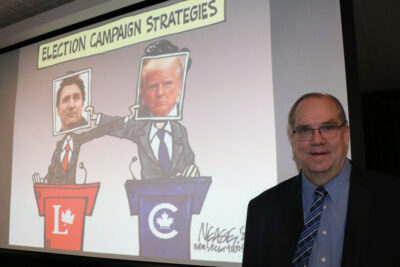Breaking up is hard to do
By Lethbridge Herald on May 23, 2025.
 Mount Royal professor Dr. Duane Bratt spoke at the weekly meeting of the Southern Alberta Council on Public Affairs (SACPA) Wednesday, on "What do the recent federal election results in Alberta and Saskatchewan tell us about Canadian unity?"
Mount Royal professor Dr. Duane Bratt spoke at the weekly meeting of the Southern Alberta Council on Public Affairs (SACPA) Wednesday, on "What do the recent federal election results in Alberta and Saskatchewan tell us about Canadian unity?"Joe Manio
Lethbridge Herald
Local Journalism Initiative Reporter
Many Canadians may be seeing red, but nearly as many are seeing blue. Liberal Prime Minister Mark Carney will form a new minority government; his party having secured the most seats in parliament during the recent federal election, completing a remarkable political turnaround amid a growing confrontation with President Donald Trump and the United States.
But the return of a Liberal government does not sit well with some Albertans.
In the aftermath of the recent federal election, there is growing talk and sentiment around Alberta separating from Canada. That sentiment fueled by various factors, including perceived hostility from the federal government towards Alberta’s resource development, dissatisfaction with federal policies, and a growing sense of distinctiveness within the province.
But it could have been different, says a prominent Alberta political scientist.
“Had Pierre Poilievre become Prime Minister, we would not be having this debate,” Mount Royal political science professor Dr. Duane Bratt told the weekly meeting of the Southern Alberta Council on Public Affairs (SACPA) Thursday.
All arguments for separatism aside, as with any divorce, splitting from the rest of Canada may be easier said than done. Some political observers say the move is pure partisan emotion with minimal thought to the consequences, or the downplaying of the possible consequences.
Bratt says that separatism is more an emotional reaction than one using logic.
“Imagine being with a spouse that you’ve been married to for 157 years, that you don’t have one or two children…you have 40 million children, and saying ‘I want to split up, but let’s not make this hard.’”
The most recent period when separatism sentiment in Alberta was at a high was in 2019 and 2020, when an Ipsos poll conducted on November 6, 2019, showed a historically high interest of secession from Canada in both Alberta and Saskatchewan by 33% and 27%, respectively.
Separatists argue that Alberta is a net contributor to the equalization payments scheme, the system where wealthier provinces like Alberta transfer funds to poorer ones. Furthermore, separatists emphasize Alberta’s strong economic ties with the United States and its distinct cultural and political identity, often citing its conservative leanings.
They often cite the fact that Alberta is a net over-contributor to the system of equalization payments in Canada. Furthermore, the majority of Alberta’s trade flows are north–south with the United States through Montana, rather than east–west with the rest of Canada.
Some political observers say talks about separatism may be really about leverage against the federal government, a strategy used by Quebec separatists called “the knife at the threat strategy” a strategy that only works if you actually have a knife.
“If you’re walking in saying you will leave, and polls show that only 30 per cent believe you, that’s not much of a knife,” says Bratt.
Anti-separatists counter that Alberta separating from Canada would have significant negative economic and social consequences, and they point to the potential disruption of the existing Canadian system.
Possible negative economic effects include decline in investments; trade disruptions; infrastructure challenges; and debt and financial instability. Mere talk about separatism alone could discourage potential investors, by making them hesitant to commit to a province with an uncertain future.
Social effects of separation include divisions and conflict; loss of unity and identity; legal and constitutional challenges; and impact on indigenous affairs.
18-17





Has anyone had experience of new relationships after breaking up with the previous person? How did you cope with it?
Can you share your experience in more detail?
Thank you for sharing your experience.